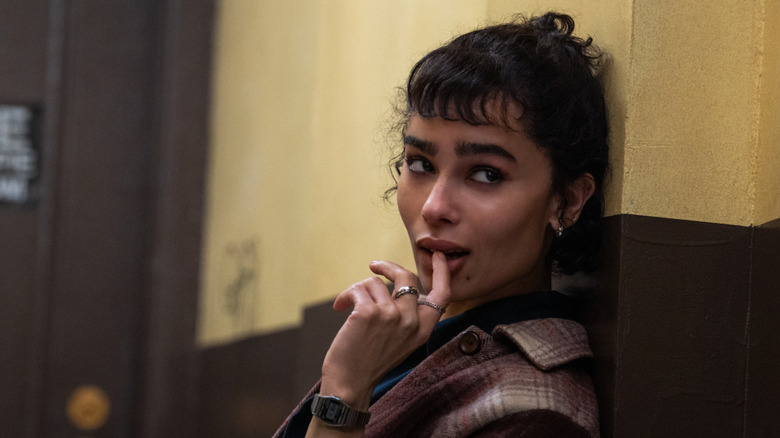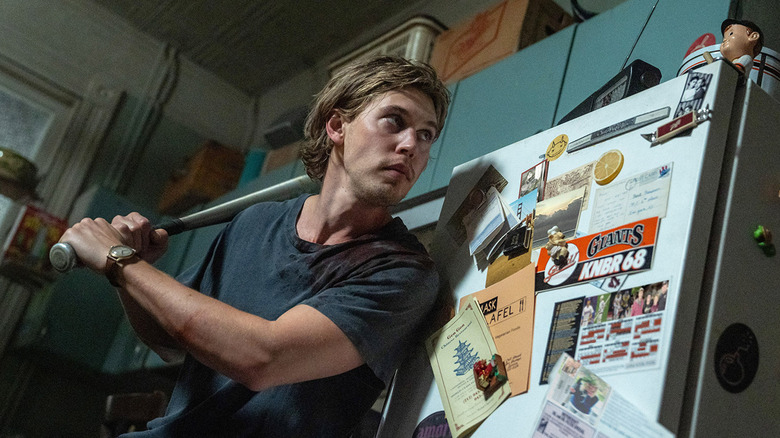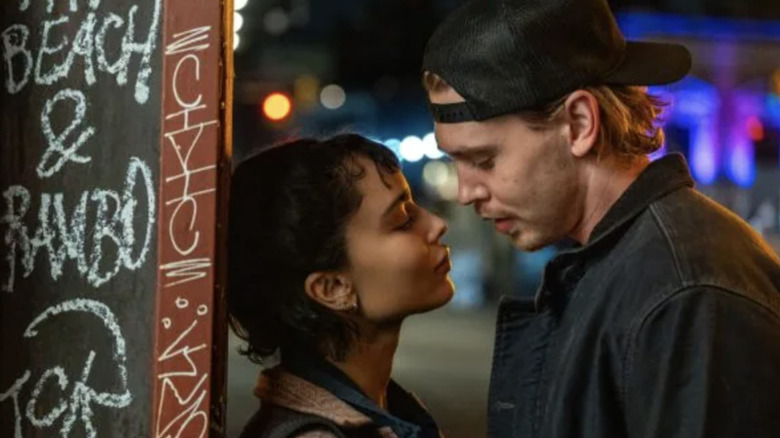Why Caught Stealing's Most Controversial Choice Works
Spoilers follow.
In mainstream Hollywood movies, and especially genre films, there exists an unspoken contract between the movie and the audience regarding a happy ending. To be sure, the goalposts on this have moved around wildly over the decades, especially after the collapse of the Production Code meant that American films needn't conform to staunch morality or feel-good vibes. One of the reasons that the lines between a standard "happy" ending and an appropriate one have blurred is thanks to a deeper general understanding of genre — in other words, audiences now realize that a Western about a gunslinger could end in the character's demise, just as a noir about a morally corrupt gumshoe isn't going to be all smiles in the end. Still, the presumption exists, and thus a movie which seems to deviate from this unspoken promise
With "Caught Stealing," the latest film from director Darren Aronofsky, that contract is broken when the film's hapless Everyman hero, Hank (Austin Butler), rushes to the apartment of his girlfriend, Yvonne (Zoë Kravitz), only to discover that he's too late and one of the very bad criminals that he's found himself mixed up with have murdered her. It's a twist which feels like a violation on several levels. Firstly, Aronofsky and writer Charlie Huston (who adapts his 2004 novel of the same name) are playing fast and loose with the film's tone, making it seem fun and frivolous while allowing darker elements to creep in. Yvonne's murder is, of course, where that particular worm turns, and telegraphs to the audience that this isn't going to be a lighthearted crime romp, but instead is a moodier and more brutal noir. Secondly, Yvonne's death seems like it might be an instance of the "fridging" trope, a term coined by Gail Simone which is short for "Women in Refrigerators," named for an infamous issue of the "Green Lantern" comic book. In brief, the term refers to a trope where violence done to female characters is solely used as emotional motivation for the male protagonist.
While Yvonne's death in "Caught Stealing" appears to conform to this trope on the surface, it's actually far more important than merely providing emotional stakes. The film is attempting to tell a story full of outrageous incidents while remaining gritty and grounded, a balance which makes it quite unique in the landscape of crime films, as most tend to pick a lane rather than walk in-between. Yvonne's murder is something which doesn't just motivate Hank, but informs the entire climax of the film. In other words, while the choice to kill Yvonne is controversial, the movie does not work without it.
Hank finds his killer instinct in exacting justice for Yvonne
"Caught Stealing" contains a number of tropes that are common to Aronofksy's films, chief among them the concept of a persecuted protagonist. This is combined with a lot of the noir/crime story tropes that Huston brings over from his source novel, resulting in Hank Thompson having a much harder time physically, emotionally, and spiritually than your average "guy gets in over his head" story. This arc is in and of itself a subversion, as Aronofsky and Huston seem to set up the film as a lighthearted romantic adventure romp: Hank, a mild-mannered bartender, only gets involved in a quest for a missing pile of cash that involves several facets of NYC's underworld because his roommate, Russ (Matt Smith), leaves the country due to a family emergency and forces Hank to take care of his cat while he's gone. It's all a case of mistaken intentions and bad timing, as Russ wasn't attempting to rip off his partners in the massive cash haul, but they assume his leaving indicates that, and Hank just through happenstance has ended up holding the key to the treasure.
It's a plot full of mistaken identities and escalating circumstances that would appear to be headed toward farce, a la "A Fish Called Wanda," "The Whole Nine Yards," or "Game Night." "Caught Stealing," as intentionally comedic as it is, does not want to be that type of film, ultimately, and it's Yvonne's murder which makes that plain. Yvonne's murder may be cruel of the film in the way it pulls the rug from under the audience hoping for more of the couple's chemistry, but it's not prurient, as it occurs off-screen. It's also not incidental, as it sets the tonal and emotional stakes for both the movie and for Hank himself. Unlike other crime films, Hank is not a former (or current) professional cop or criminal; he's an average guy, and has never killed anyone in his life (intentionally, anyway — more on that in a moment). Thus, several hardened killers in the film, especially Detective Roman (Regina King) and the Orthodox Jewish duo Shmully (Vincent D'Onofrio) and Lipa (Liev Schreiber), confidently believe that Hank is no killer. They're right, and yet Lipa and Shmully — who are otherwise good Jewish boys who love their mother and observe their faith — keep reminding Hank that the world is corrupting and that killing is a no-more-complex matter than pulling the trigger. When Hank discovers that the duo were responsible for Yvonne's death, his intentional murder-by-car-crash of them feels more weighted, more significant, and more just than it would if Hank were a seasoned killer.
Yvonne's death keeps Hank from always crashing in the same car
Of course, it's true that Yvonne's sudden exit from the film leaves her character feeling incomplete, despite a brief moment at the end of her final scene when Kravitz indicates that perhaps Yvonne was willing to "go deeper" in her relationship with Hank as she alluded to earlier in the film. Yes, her death is used to motivate Hank in terms of increasing his fear, anxiety, grief, loss, and ultimately, desire for revenge. It also motivates the ending of the film, and allows the development of Hank as well as the closure of the plot to completely align. Throughout the movie, Hank has been shown as well-meaning but irresponsible, running from commitment and his deeper emotions, which is something that Yvonne was trying to get him to fix. It turns out that Hank's issues stem from a tragic incident in his past, wherein he and his high school baseball team buddy, Dale (D'Pharaoh Woon-A-Tai) were drinking while he was driving, and the car accident that resulted left the vehicle wrapped around a pole, Hank's knee damaged, and Dale dead. Hank suffers from recurring nightmares about the crash, and has refused to get behind the wheel of a car since. It's only through his experiences in the film that he's finally able to take responsibility for the life he took, as unintentional as it may have been.
In another clever subversion, Aronofsky and Huston provide a faux resolution to the film just before its actual climax. Having eliminated the criminals trying to kill and/or frame him, Hank finally gets behind the wheel, driving Lipa and Shmully home (who are abstaining from driving in observance of the Shabbos), the men promising they'll leave Hank alone and give him a couple hundred grand for his troubles. That's when Lipa pulls out the distinctive gun cigarette lighter that used to be Yvonne's, telling Hank and the audience that they're responsible for her murder. Thus, Hank enacts murderous retribution the only way he knows how: by intentionally crashing the car into a pole. It's a moment which brings every major thematic thread of the film and the character together: Hank takes responsibility instead of the easy way out, he finds his moral rationale for killing, he makes peace with his past and he faces it by essentially re-enacting it. None of this would work emotionally or logically without the loss of Yvonne, which proves that her death, although robbing the film of a great actress giving a charming performance, is both important and necessary to the story. While the choice can still absolutely be disliked and criticized, it's not a frivolous or irresponsible one.


